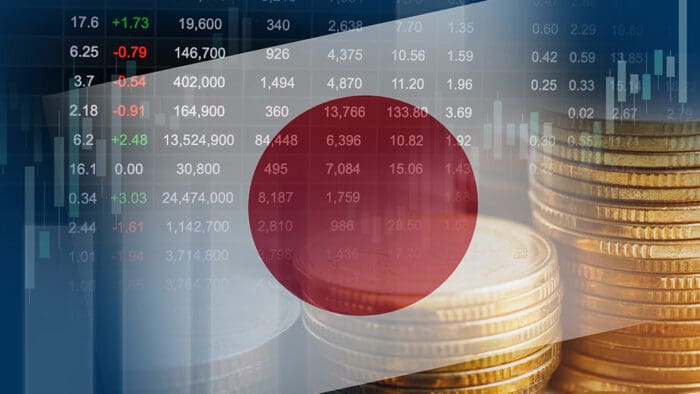We hear it all the time on the news and we read it in the headlines, but where did these popular terms come from and what do they mean? Cassidy Clement, Senior Manager of SEO and Content at Interactive Brokers is joined by Chief Strategist, Steve Sosnick to discuss some popular financial market jargon.
Summary – Cents of Security Ep. 17
The following is a summary of a live audio recording and may contain errors in spelling or grammar. Although IBKR has edited for clarity no material changes have been made.
Cassidy Clement
Welcome back to the Cents of Security podcast. I’m Cassidy Clement, senior manager of SEO and content at Interactive Brokers. Today, I’m your host for our podcast and our guest is Steve Sosnick, chief strategist here at Interactive Brokers. We’re going to discuss financial market jargon, and we hear it all the time on the news. And we read it in the headlines. But where did these popular terms come from and what do they mean? Welcome to the program, Steve.
Steve Sosnick
Thanks, Cassidy. It’s a pleasure to join you.
Cassidy Clement
Great. So, for the listeners that don’t know, could you tell us a little bit about your background in the industry.
Steve Sosnick
Yep, I’ve been at it probably since long before many of the listeners were born. I started in the late 80s at Solomon Brothers. If you’ve ever read the book Liar’s Poker that that occurred about a year or so before I joined that firm, I was a proprietary trader there. As well I also did stints at Lehman Brothers, at Morgan Stanley until I joined the predecessor firm for Interactive Brokers, which was called Timber Hill, which was an options market making firm and I joined there in 1995 I believe. And basically, we traded options and stocks and futures and all sorts of financial products for many years and then somehow through some twist of fate, I became allowed to talk to the press. And so, my role changed from proprietary trader, which while I was doing this, we stopped proprietary trading in a big way. We got out of that business, and I became really a talking head putting all those years of experience hopefully to work for people.
Cassidy Clement
Well, that’s perfect for today’s topic, because I’m sure you have a lot of experience with all of these phrases and these words, but a little thing for myself. When I first started here at Interactive Brokers, I started with editing some of your commentary videos and helping do some of the optimization on the content and writing some of the questions, and initially out of college, well, I had the business degree and the understanding of a lot of the terms. There were times where I got into the media room, and just heard words I had never heard before. One of them we’re going to talk about, dead cat bounce. I heard a bunch of people talking about this and, first I was concerned. Then I wasn’t sure, so I was like, alright, let me Google this before I just decide to make up my own definition for what I think this is. But for the most part I was hearing this financial market jargon more and more every day with the content that I interacted with on IBKRCampus or Traders’ Insight and those were mainly economists, head traders, or journalists. But usually…
Steve Sosnick
Or me, unfortunately.
Cassidy Clement
Or you right. Or, my coworkers. But from that perspective seeing it firsthand for my job, but for the general public, where would they be hearing the common financial market jargon and who are the usual people that will use them that are more of, I will say, well-seasoned people who are using these phrases every day?
Steve Sosnick
Yeah. I mean, I think it’s important because these terms get thrown around a lot. Most of them have made it into the general media, certainly financial media, they get thrown around in social media a lot, I think misused a certain amount of time on social media and so, it’s important to understand what people are talking about and and because it’ll give you a deeper understanding of the markets. Any business that has very specialized techniques or specialized products develops its own jargon. In this case, it’s a business that has a lot of specialization, but also is accessible to the general public. And so, I think it’s important that you bring this kind of intersection to people’s attention.
Cassidy Clement
And I’m sure in today’s day and age with how easy it is to access information or just see it on social media and so on and so forth, it’s important to understand what this lingo is, because as you go further in life, you’re likely going to interact with other types of investment opportunities or investment risk and knowing the talk for it is very important, because sometimes things will sound scarier than they actually are, nicer than they actually are, or cute. And they’re actually not in a cute setup. It’s not a great situation.
Steve Sosnick
There’s a lot of gallows humor that that persists on trading desks, and so a lot of terminology that sounds awful is really benign and vice versa. And also remember, because these terms get misinterpreted, it’s important. It’s important to know your source and to know to get the definitions from a reputable source, and I’d like to think we are a reputable source, you and I, rather than sometimes getting misapplied knowledge by people who have a vested interest in misapplying.
Cassidy Clement
Really, we’re looking at some common market items, a couple of will say like other names for stocks and stock groups, some market views and then finally some economic growth and economic policy phrases. So, the first two, which are like Finance 101 or Business School 101, is the bear market versus the bull market. So, if you were in the classroom with the Finance 101 students, how would you describe those two to them?
Steve Sosnick
Fairly simply, a bull market is one that’s rising, and investor psychology is positive. A bear market is where it tends to be, one that’s falling and investor psychology is negative. And the psychology tends to go hand in hand with the motion of the market. People tend to feel good when markets go up. They tend to feel rotten when markets go down. It’s funny because I’ve been using these terms forever. These terms have been used for ever. And I actually looked them up because I was like, where do these come from? I’ve been using them for so long, you know. And I was afraid that I would sound like Ron Burgundy when I was, “Ohh no one knows the names of these terms. It’s lost to history”. And then you’d correct me with something really silly and obvious. But it’s really, there really isn’t a consensus where it comes from. One school of thought is bulls, when they charge and they point their horns upwards, and bears when they attack, they swipe downwards – maybe. There’s some school of thought that it had to do with, the fur trade that a lot of fur trappers would sell the bear skins before they had them and so, they would hope the price that they sold at a high price and then buy it back later. None of these are really satisfying. It just sort of these terms have just become so generally accepted to be bullish and bearish. But these are truly, I think lost to history.
Cassidy Clement
So those generally, bear going down, swiping down, bull going up, pointing up. That’s a really boiled down version of those terms, I would assume. But the next one is something that I heard a lot in my business Capstone course, which is a blue-chip stock. And those, as far as I know, are more of like the established highly valued companies. So, like what are some of those ubiquitous blue-chip stocks that are always the crown jewels that are up on on financial media?
Steve Sosnick
Well, first let me throw out the history of that, because I did bother to look it up.
Cassidy Clement
Please go for it.
Steve Sosnick
That term is about 100 years old. And it comes from turn of the century poker chip sets and the blue chips were the highest valued as opposed to the white or the red. So, you had fewer blue chips in poker in a round. If you could imagine that sort of round poker chip holder. And that’s where the term supposedly comes from. And now, I do actually believe that that’s the case. And you know, because they were the most valuable stocks on the board at the time. Now Blue Chip has, it has evolved somewhat. These are the perennial best in class type of companies. It doesn’t necessarily mean the highest price company because as I’m sure you’ll discuss at length in other podcasts, the price of something does not necessarily, in the stock market sense, reflect its value per se. You can, have some divergences, but in general you know if I gave the listeners enough time to come up with a list of blue-chip stocks, I’m sure you could: Apple, Microsoft, JP Morgan, Goldman Sachs, Boeing and take from the list, they’re sort of market leading companies generally with a bit of a pedigree and in some cases that pedigree is hundreds of years old. In some cases it’s measured more in decades, but that, I think is the way to think about it, it’s a fairly nebulous term. There’s no definition of what the blue-chips are. In general, you could think of the 30 stocks that are in the Dow Jones as Blue chips. To another extent, you could think of the 500 stocks that are in the S&P 500 as blue chips. But there’s no real established list of what all the blue chips are.
Cassidy Clement
Right.
Steve Sosnick
It’s sort of a catch all.
Cassidy Clement
Got it. So, it’s more about the business track record being more established than just the flash-in-the-pan type companies, they have a little bit longer of a standing?
Steve Sosnick
Think of, I’m thinking now of, drug stocks where Merck, Johnson and Johnson, Pfizer are considered the blue chips. There are also a whole bunch of smaller biotechs which you know may end up in some cases being a better investment. But you don’t know because they’d have drugs and development. If they work, they become super valuable. If they don’t work, the company fizzles out. Whereas you know, Merck, Pfizer, Lilly, that group of stocks. They have these huge portfolios of drugs and and they make a lot of money off them and generally pay dividends as a result. So, it’s just that kind of connotation.
Cassidy Clement
Speaking of some of the flash-in-the-pans, something super-hot topic-ish is meme stocks: So, who would you define meme stocks? Because to me it’s viral popularity with social media and social engagement. That’s kind of how they got their boat to float in the ocean. But I know that from a trading perspective, you may have a different idea.
Steve Sosnick
Well, this one is actually a relatively new term. The term really didn’t exist until about two years ago, 20/21, when the term caught fire. It was because these stocks all had a huge following on social media. There is no established definition for them. For the most part it is just because they get talked about on social media and their following can be quite passionate. The best definition, I’m actually going to credit my son for this one, he said that meme stocks to him had all that social media component but also an element of nostalgia. Because there was a sort of idea that, “Oh my gosh, how can these companies that were so important to us when we were kids, be in any sort of trouble?”, and that includes GameStop, that includes AMC, it included Bed Bath and Beyond, which is no more. The list included things like Nokia, BlackBerry, Build-a-Bear Workshop. So, I think it’s interesting, you know, Tupperware kind of came and went recently as a so-called meme stock, but that’s another one that got an element of, you know, grandma bringing the the cranberry sauce in a Tupperware.
Cassidy Clement
Yeah, absolutely. The Tupperware parties. Yeah, the millennials definitely, I think, felt some level of nostalgia with those, which now, those once kids, have some money and some interest and said, “Hmm, let me look at these a little bit deeper”, and I agree. When you add an element of something that’s intangible, like nostalgia, it could push somebody sometimes to want to invest further.
Steve Sosnick
Think that’s what made them morph from just sort of curiosities to having this fervor behind them. There was a lot of passion behind them and unfortunately the term also became associated with a lot of unrealistic expectations. And I don’t want to dwell too heavily on it. But I think you know that’s because ultimately, it became sort of a sideshow, and it did not end well for most or many of the people involved. But you know, especially again we’ve got AMC near all-time lows and and Bed, Bath and Beyond literally going out of business and people actually arguing with me to the end, when I was saying that that it was very clear that the stock, and this was by analyzing bankruptcy proceedings and stuff of that nature, that there was really no value left for shareholders. I’ll let you explain bankruptcy in a different podcast, how that works. But and then people arguing with me, yes, it does. And at some point, because they were just impassioned and I guess one of the lessons to take away here is, passion does not replace fundamentals in the long run. Combination of social media and nostalgia is what led to that phenomenon.
Cassidy Clement
The next one was something new that I didn’t totally know of, and that was the Dogs of the Dow term, which I was talking to you about earlier. So, that was about the highest dividend yielding stocks within the Dow. I never heard that before. Have you been exposed to that phrasing a lot?
Steve Sosnick
Yeah, I mean it’s an older strategy. I’m not a huge fan of the Dow Jones Industrial average as market barometer. The reason for that is a little bit of history, if you’ll indulge me. The Dow Jones was created by a man named Charles Dow, and I guess he later had a partner, Jones, and they then founded the Wall Street Journal and other things. But in the 1800s, they wanted a way to measure the stock market. And so, he put together the 20 most important industrial companies, the blue-chips of that era, as it were, and wanted to calculate some measure that put them together, but his technology was pretty much limited to a pencil and paper and …..
Cassidy Clement
And an abacus.
Steve Sosnick
Maybe that worked better in Japan and in China, I don’t know, that he had access to the Abacus. So, basically it had to be something that could be done relatively exactly. So, he did what he thought was the right thing to do. He took the average price, basically added up those 20 stocks prices and divided by 20 and there was your Dow Jones average. It later became 30, he added industrials, transportations over time. I get the concept, but now that we live in an era of computers and we don’t have to do that, it’s a relatively poor measure because it’s price weighted. And remember, I just said that price doesn’t necessarily represent value. So, a stock, whatever the stock is that has the highest numerical price has a higher weighting than a stock that has a lower lowest numerical price, which can be very arbitrary, and so most other indices that you see, the Nasdaq 100, the S&P 500, et cetera, they’re weighted by market capitalization, which is the stock price times the number of shares outstanding. Then, you sum those all up and average them and there’s a divisor, etc. because of stock splits and things of that nature. So, that tends to be a more widely accepted and robust calculation. So, getting back to it, the Dogs of the Dow, you would take the 30 stocks that performed: You could look at it one of two ways. You could find the 10 stocks that have the highest dividend yields. You could assume that, the way the dividend yield is calculated, if a company pays out X in dividends, you divide that by the share price that you’ve paid for the stock. That’s your dividend. So, if the stock’s dividend has remained relatively constant or even risen and the price has fallen, its yield has gone up. And so, you could buy the 10 stocks that have the highest dividend yields because you could argue that they’ve underperformed. The other way that I’ve seen it done is you just buy the 10 stocks that have performed the worst and potentially sell the 10 stocks that performed the best. And over time those may revert to the mean. I prefer the dividend one a little bit more. But dividend yield, because stocks don’t always revert to the mean. Stocks are not necessarily a mean reverting process. So, they can go up, they can go up or down without reverting to whatever mean or average you’re talking about. So, that’s a long way around. I think it’s a neat strategy, it’s been around for a while. There must be an ETF that’s attributed to it because there’s an ETF attributable to pretty much any strategy we can come up with.
Cassidy Clement
So, the next two fall a little bit similar. So, it’s of course the dead cat bounce and short squeeze. So, talking about dead cat bounce which is that short and then right down the roller coaster and then a short squeeze. I’ll let you explain these because these are obviously super popular in financial media and financial journalism. I see them all the time. If there is one topic that you have to talk about, everyone asks you about when you work in financial services, and you go to a dinner party, it’s what is shorting, what is a short squeeze? People hear about it, and they don’t understand initially because it seems easy. And then you think about it, and and your brain hurts.
Steve Sosnick
Let me separate them out. Dead Cat bounce is just, you know, sort of traders’ dark humor. You know, a stock is falling and eventually it finds a level where it stops falling, and then it might actually lift up a little bit. And that’s sort of the term dead cat bounce. Obviously, the traders that came up with this were not PETA members. Whenever I don’t know exactly how long the the terms been in in use, but it’s been in use for a really long time, which of course leads to the corollary where a lot of traders say, “Well, dead cats don’t bounce”, leaving the imagery aside. But the rationale behind it is markets overreact. They typically do in both directions, and so in theory, if enough people panic and sell a particular stock, it may get sold down to the point where probably, it should not have been pressed down that far, and so you get buyers stepping in to to buy it. And, of course, that turns it around and it and it bounces a little bit. So, that’s where the term comes from. It’s completely non-scientific. It’s completely rooted in…..
Cassidy Clement
Just falling and hopefully bouncing a little.
Steve Sosnick
Exactly. Dark humor and hope.
So short squeeze is a more important one and and a trickier one. I guess it’s important to understand what selling short is before I explain what a short squeeze is. But when you buy a stock, your intent is to buy low, sell high, so you buy the shares. You hold on to them. They go up in price and you sell high. That’s the goal. Doesn’t always work that way as we know, but that’s the hope. The hope for a short seller is to sell the stock high and hopefully buy it back lower. Well, how do you do that? How do you sell stock that you don’t own? First, the term for that is ‘selling short’. What you do is, since whoever’s buying the stock expects to actually get shares, your broker will go out and borrow those shares on your behalf. They will often charge you a fee for that because anytime you borrow things there is a fee associated with it, we explain that elsewhere in IBKRCampus, so, it won’t belabor the mechanics of that. The seller borrows shares. And you know, hopefully tries to buy them back later. There are some specific risks when you’re selling short. When you buy stock, if you have enough cash, it’s yours, you own it. It goes up. It goes down. That’s that.
Cassidy Clement
It’s still yours.
Steve Sosnick
It’s yours, you know, if you buy it at 20, it goes to 40, fabulous. If you buy it at 20 and it goes to 10, that stinks, but it is what it is. In the case when you sell short, the borrow rate is a variable rate and can be a very, very variable rate. And it also assumes that there are people willing to lend the stock. Now we have a whole department of people whose role it is to facilitate these borrows, and quite frankly, again, because there’s a fee associated with the borrow, this is a facet of our business. But that rate can change. So, if you have very high demand for a stock to be shorted, it gets increasingly more expensive to borrow. And at some point you may not be able to find the stock to borrow. Or whoever was lending it to you, sold the stock. You don’t know who’s lending it to you, it’s done through the middleman. But whoever’s you know, let’s say our stock loan department finds someone who has 100,000 shares of stock and we lend that stock out to customers who’ve shorted 100,000 shares. If that original customer who was long [of] it sells out of their 100,000 shares, our stock loan department has to scramble to to find 100,000 shares for the customers. They may not be able to do that at a very attractive price. They may not be able to do it at all, in which case it becomes incumbent upon whoever shorted the stock to go out and buy it back. Also, because there’s a loan involved, if the price of the stock, in the case where I said, if the stock goes from 20 to 10, if you’ve bought it and you paid cash for it, you’re out. But it stinks. In the case of shorting stock, there’s always a borrow involved. And so, let’s say you’ve sold the stock at 40. Well, that’s collateral against the stock you’ve borrowed. What if the stock goes up to 60? You have to post more collateral or you can’t borrow it and you’re forced to cover. And if enough people either can’t get the stock or it starts to go up and it becomes too expensive for them to be short the stock, or the demand to short, it becomes offsides. That’s when you have the short squeeze and those and those can cause big, big rallies in in stock prices in a very, very short period of time.
Cassidy Clement
Right. That’s what causes those rises. So, the quick definition, I guess in a way, is those people who did buy the shorts, they’re starting to buy stock now to limit that loss, and we sold it short. I’m sorry, right?
Steve Sosnick
The people who sold it short are forced to buy stock to limit their losses, whether to minimize the amount of borrowing, et cetera, and they’re forced to buy this stock. There’s a feedback loop because as the stock goes up, it induces more people to have to cover and that’s where, and now the problem is, these tend to end abruptly, violently so you know, it’s a little tricky because a lot of times it’s if you’re seeing the stock rise because of this, it can be pretty seductive because you say, “Oh, this stock is zooming”, but once that source of demand dries up, the stock often comes back to Earth. And also bear in mind there’s a reason why a lot of times, heavily shorted stock are heavily shorted, because there is something fundamental mispricing in the stock, they are overvalued. But the problem is it’s a lot easier to exploit a stock that’s undervalued because again, you’re assuming you pay cash for it, your risk is defined. You buy the stock and and it goes up or down than it is to – you’re stopped out at zero, basically. In the case of a short squeeze, it’s harder because you’re always using borrowed money. And there’s no limit to how high the stock can go. If you buy it at 20 and it goes to zero, you lost 20. If you sold it short at 40, there’s nothing that says it stops at 60. It can go to 80. It can go wherever. And so, these become very, very treacherous and unstable situations. And they came into the fore as a result of the meme stock phenomenon, because a lot of fundamental investors saw that these stocks were overvalued. But there’s another saying, and this is for the one when we, when we actually do sayings, “Markets, can remain irrational, longer than you can remain solvent”. And so that is the risk. And so, the term short squeeze is not new. I think there have been short squeezes for as long as there have been shorts.
Cassidy Clement
It’s definitely been popular since the the meme stock headline.
Steve Sosnick
I will say social media has learned to weaponize it in a way, whereas before it was just one set of professionals trading with another set of professionals. Now it became a bigger part of the common parlance.
Cassidy Clement
Right, so now it’s a little bit more Main Street talk than it was just Wall Street for a while that kind of goes perfectly into my next two, which are two things that I remember learning very early in maybe 4th or 5th grade and that is panic selling and bubbles. So, I remember learning about the Great Depression and people panic selling different things or pulling all their money out of places and different bubbles popping. I was in school when the 2008 real estate bubble happened. Both of those were on the negative side. We will go to the positive one after. What from those from the panic selling in the bubble would you kind of work together? Would you say they work together?
Steve Sosnick
They’re opposite sides of the same coin. They’re when people become irrational in one direction or the other. Unfortunately, the bubble usually leads to the panic, which is what I said before things overshoot. I mean that’s grossly overshooting on a macro level, but it’s when rational decision making gets replaced with visceral behavior with emotional behavior. So, in the sense of a bubble, they start out as something generally quite positive. Some asset is going up, real estate is going up, markets are going up. It looks great, but at some point, and it’s easier to tell us in hindsight than in real time, it flips from constructive investing to somewhat of a mania. In the case of the global financial crisis, we had the real estate bubble was one part of it. Real estate was appreciating. That’s a good thing if you’re a homeowner. If you don’t own your home, that’s a problem. But you know, considering the majority of people are homeowners, most people really liked it. Well, as the prices of real estate got more expensive, I would say a lot of financials, there were a range of financial institutions that got a lot more creative about how you would finance your purchases. And I won’t step on the the homeownership podcast that you’ve done, but let’s just say for argument sake in a standard mortgage you buy, you put down 20% and you borrow the rest, and you have to meet lending standards. Well, in the early 2000s those lending standards decreased and decreased and the amount of money you would have to put up decreased and decreased. So, you could buy homes for almost 0% down and finance the whole thing and ultimately that becomes a fragile and somewhat unsustainable situation. Well then, what happens? So, then the prices start to come down. Those who made those crazy loans, basically go out of business. And that sets off a chain of panicky people in the other direction. And so, you know, that’s overshooting in a grand sense. But they’re two sides of the same coin. It’s when rationality is replaced by emotion in chasing something and people, when they’re emotional, tend to get around, you know, tends to breed irrationality. And I will say having moved through both the bubbles and and crashes, the crashes are worse because people: One thing if you give back paper gains, you know you had some, you had something that was worth, you know you had a house was worth $250,000. It was worth $500,000, but you couldn’t, you had no place to move to anyway. And now it’s back to being worth $250,000. It sucks, but….
Cassidy Clement
You still have a house you still have.
Steve Sosnick
But if you got foreclosed on because you had some mortgage that you couldn’t pay off or afford, and you had the the house that you that you were the one who paid $500,000, for you’re out and and people react very, very poorly. And that’s why I think it’s important for anyone to listen to this. You can’t go in over your head with investments. Because they don’t always workout and at least you want to be in a situation where if it didn’t work out, no one investment decision has you risking it all, or has you risking too much over time. You know, one of my friends wrote a book about this. A lot of what he’s found, the best investors are risk averse, not risk takers. Because you know, a lot of times it’s if you lose too much, you can’t get back in the game.
Cassidy Clement
That’s kind of like with the saying of the reason that some people are wealthy is because they didn’t go out and spend or risk all of their money, right? Right. Because they sometimes keep the wallet close to the vest.
Steve Sosnick
Exactly. Exactly.
Cassidy Clement
But if we were to go to the positive side, let’s switch it up, make it a little bit more on the positive side, another piece that a lot of people here. Especially with risk averse type investors, is the word safe haven? From what I know, something that’s a little bit more of a risk averse security or something more established. But if you were to name a few things off your head that people usually coin safe havens, what would those be?
Steve Sosnick
Cash and cash equivalents tend to be your standard safe haven. There is no true safe haven. Let me say that because…..
Cassidy Clement
No investment is guaranteed to be safe.
Steve Sosnick
Or even if you have something like U.S. Treasury bills, which have a a flawless record of paying back over time, even there if the rate of inflation is greater than the rate of money you’re earning, you know your purchasing power overtime suffers. So, but the point of the idea of the safe haven is that you’re pretty sure, you’re going to get back out of it, at least in nominal terms, what you put into it. You know, the old joke is the ultimate safe haven is the Sealy Posturepedic. You know, cash in the mattress.
Cassidy Clement
Right. Exactly. Yeah. Yeah. The cash padded mattress. Exactly.
Steve Sosnick
But realistically, you know, in a more realistic sense, it’s as I mentioned, short term treasuries.
Cassidy Clement
Like treasury bonds, things like that.
Steve Sosnick
See Treasury notes. Yeah, Treasury notes, bonds. The US Treasury has at least so far – fingers crossed.
And if you heard me knocking wood there. Has a flawless track record of paying back people the dollars that they’re owed. CDs in many senses are a very good safe haven, boring. Now, the thing is, safe havens are boring. Let’s be real.
Cassidy Clement
Right, exactly.
Steve Sosnick
But CD’s, if you are below the FDIC limit, which is currently $250,000, the government is back stopping the CD of the bank. So, effectively they are government protected securities, and so those are very safe. Savings accounts, checking accounts. Again, none of these are exciting, but these are……
Cassidy Clement
Right. None of them look illustrious or are super exciting for you to talk over dinner with your friends. But that’s the point.
Steve Sosnick
If you put it. Exactly. Now, if you want to extend it a little bit, let’s say within the stock market, your safe havens tend to be stocks that are less volatile or have steadier earnings streams. Utilities, for example, are considered safe havens because ultimately everybody needs to turn on the lights. It’s one of the last bills that that people skip. They’re regulated industries. So, there’s a certain profit that they can make by state mandate, but they’re also pretty much guaranteed to make a profit under most circumstances. There are outlandish ones. Recently, Hawaiian Electric, the stock, got pummeled because as we’re taping this, it’s not clear whether they are or are not to be contributing factors to the wildfires in Maui. But for the most part, utilities are considered safe havens because they pay a nice, steady dividend. They earn pretty much a straight amount of money, and they tend not to move as much. Compare that to, let’s say, I gave the example before of a biotech stock where the risk reward is enormous and so the safe havens, generally speaking, bonds tend to be more of a safe haven than stocks. Certainly, highly rated corporate bonds tend to be better than low, lower rated junk bonds. I think that’s kind of endemic in the term there, and that’s the way to think about it. Safe havens are relative.
Cassidy Clement
You still have to do your research on everything, and like I said, no investment is perfect or safe. But when we look at the broader economic scope there are three things that are super common in today’s financial news: Hawkish versus dovish monetary policy, and then stagflation. So, I hear those with the word ‘Fed’ somewhere in the same sentence, based on my job, at least once a day. How would you talk about the hawk versus the dove and how stagflation impacts the economy from a wider scope?
Steve Sosnick
The Federal Reserve and Central banks in general. So, if you’re listening to this in Europe, it’s the ECB. If listening in Canada, it’s the Bank of Canada, et cetera, et cetera. But we’re going to use Federal Reserve because we’re sitting here in the US and it’s the biggest of the central banks. Central banks influence the economy through monetary policy. In the case of the US Federal Reserve, it actually has what’s called the dual mandate, and that is stable prices and full employment. The problem is they don’t always work together. A lot of times when you have full employment it leads to inflation, because you have to get people employed and they’re going to hold out for more money. On the flip side, if you have stable prices, it can generally mean that the economy stinks and people are losing their jobs. So, they have a tricky balancing act. The ways they do this are through interest rate policy and through buying and selling securities on their balance sheet. I again we’ll leave the full mechanics out of this. It’s also important to remember that inflation is how much prices are rising over a given period of time, whether it’s monthly or annually. Can I get mathy? I mean, basically, there’s an index, the CPI, the consumer price index, and that’s an index of how much they calculate this basket of stuff will cost. Inflation is the change in that basket, how much it goes up or down over the course. So, that’s really your first derivative of prices. And so stagflation describes a situation where there is inflation, but the economy is stagnant. That’s kind of the worst scenario given the the dual mandate that I gave you, meaning that the economy kind of stinks and we have inflation. So, it’s essentially the Fed is kind of failing on both of its mandates.
Cassidy Clement
Just rough out there when that gets used.
Steve Sosnick
Yeah. It’s not a great situation most of the time. When central banks are stimulating the economy, lowering interest rates, you know, basically making money plentiful to adding money into the system, that’s considered a dovish policy. When they’re fighting inflation, raising rates and doing other measures to reduce the amount of money that they’re putting into the economy, that’s called hawkish. So, generally, you’re fighting inflation when you’re hawkish, when you’re dovish you are generally stimulating the economy. Those terms, I again, I looked back at those, those they actually do have some precedent, not even beyond like a market precedent. They go back to like the 1700s hawkish cause. You are also the. Term hawkish referred. To in military policy, are you hawk or a dove? Are you militaristic or are you more peace?
Cassidy Clement
Right, yeah.
Steve Sosnick
And so that, I think morphed into central banking. So, hawkish is when the policies are designed to take a little steam out of the economy and out of prices, getting inflation to stay stable. Dovish is when they’re willing to put money into the economy, lowering rates to get the economy stimulated.
Cassidy Clement
I kind of think when I was learning this for Series Seven was a lot of times in most art you see doves with an olive branch, they’re bringing you something. It’s peaceful. Hawks usually come down and take away their food. They swoop and take it away. So, I think of the money giving and taking in those policies, but initially someone might say, ‘what do birds have to do with me trying to get a home’. That’s why bring this up today. So, we covered a lot, but what are some other important items that you think would be important for our listeners to pay attention to? I know doing your research is important, but from the perspective of a reader of financial news, a writer will say a talking head on a lot of shows, what would be your advice to people as they go through seeing all this jargon as they start off their investment journey?
Steve Sosnick
First of all, keep a level head. I think if you keep a level head and keep an eye on and and I think ultimately it’s more important to focus on your risk than your return. It’s very easy when you’re investing in stocks to think about how much money you could make and at the expense of thinking how much you can lose. And as I alluded to earlier, a lot of really successful investors don’t think that way. They think about the balance between what they can make or what they can lose and actually try to avoid situations where they’re prone to lose a lot of money. They’re not necessarily big risk takers. Or if they are risk takers, it’s under very prudent circumstances. And so, I think that’s really the way you should approach a lot of this stuff. It’s very easy, particularly if you’re engrossed in social media or talking with your friends. You know, like the stock’s going to double. It’s going to triple. Why, based on what? And if it doesn’t, what’s going to be the outcome? What are the odds that this stock might triple? Is it more likely to just do nothing? Is it, you know, more likely to go down? Who is telling you that it’s going to triple? Is it somebody you know and trust? There’s just some loud voice who gets a lot of publicity, and these are the type of things you really have to keep in mind. You said do research, but the question is where, and I think going to Reddit is not doing research. Finding out some places that you know are our trusted sources and I like to think that IBKR campus qualifies as one of them as one of them. We are one of them, we’re not the only one. Our goal, you may say, “Oh, well, we just want people investing”. Yeah, we do, but we want to keep our customers, especially the people who are listening to this podcast, to keep for customers for 50 years, potentially we don’t want you to blow up.
Cassidy Clement
We want to offer you a way to educate yourself as well on what the products actually are and give you an understanding to look or the potential to learn further about how the mechanics are, as you talked about earlier with shorting and so on and so forth, you can’t just look at a few phrases that you saw on line 10 times and assume that the jargon is always positive.
Steve Sosnick
The harder the sell, the more the hair on the back of your neck should go up. The more weary you should be. Why? And that goes for anything. Why is this person selling this so hard? If it’s a good idea, a good purchase, a sensible, educated approach will generally work. What are the advantages of this stock, this product, this computer, this, whatever? If it has real advantages, you could be told them in a very rational manner and decide for yourself if those things are important to you. If you’re being told this is the greatest thing since…..or you got to buy it now. That should make you a bit nervous. That should make you that should make you step back.
Cassidy Clement
Use your head. Think about it a little bit more logically. And while these terms have been around for a long time, anybody can technically use them in whatever connotation they want, so definitely good, as you said, to make sure that your sources are accurate as well. So, thanks for joining us and talking about jargon today, Steve.
Steve Sosnick
My pleasure, Cassidy.
Cassidy Clement
And as always, listeners can learn more about an array of financial topics for free at IBKR campus.com. Follow us on your favorite podcast network, and feel free to leave us a rating or review. Thanks for listening, everyone.
Disclosure: Interactive Brokers
The analysis in this material is provided for information only and is not and should not be construed as an offer to sell or the solicitation of an offer to buy any security. To the extent that this material discusses general market activity, industry or sector trends or other broad-based economic or political conditions, it should not be construed as research or investment advice. To the extent that it includes references to specific securities, commodities, currencies, or other instruments, those references do not constitute a recommendation by IBKR to buy, sell or hold such investments. This material does not and is not intended to take into account the particular financial conditions, investment objectives or requirements of individual customers. Before acting on this material, you should consider whether it is suitable for your particular circumstances and, as necessary, seek professional advice.
The views and opinions expressed herein are those of the author and do not necessarily reflect the views of Interactive Brokers, its affiliates, or its employees.















Join The Conversation
For specific platform feedback and suggestions, please submit it directly to our team using these instructions.
If you have an account-specific question or concern, please reach out to Client Services.
We encourage you to look through our FAQs before posting. Your question may already be covered!